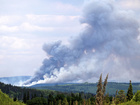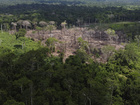Cities across China opened their air raid shelters to offer residents relief from the heat Friday as unusually high temperatures across parts of the country started claiming lives.
Northern China is experiencing strings of days with record-high temperatures, compounded by drought. Earlier this week, Beijing reported more than nine straight days with temperatures exceeding 35 C (95 F), according to the National Climate Center — a streak unseen since 1961.
 Full Story
Full Story
As a warming Earth simmered into worrisome new territory this week, scientists said the unofficial records being set for average planetary temperature were a clear sign of how pollutants released by humans are warming their environment. But the heat is also just one way the planet is telling us something is gravely wrong, they said.
"Heat sets the pace of our climate in so many ways ... it's never just the heat," said Kim Cobb, a climate scientist at Brown University.
 Full Story
Full Story
After four years of rising destruction in Brazil's Amazon, deforestation dropped by 33.6% during the first six months of President Luiz Inácio Lula da Silva's term, according to government satellite data released Thursday.
From January to June the rainforest had alerts for possible deforestation covering 2,650 square kilometers (1,023 square miles), down from 4,000 square kilometers — an area the size of Rhode Island — during the same period last year under former President Jair Bolsonaro. This year's data includes a 41% plunge in alerts for June, which marks the start of the dry season when deforestation tends to jump.
 Full Story
Full Story
Maritime nations agreed Friday to slash emissions from the shipping industry to net zero by about 2050 in a deal that several experts and nations say falls short of what's needed to curb warming to agreed temperature limits.
Countries at the meeting of the United Nations' International Maritime Organization in London, seen as key to curb global warming to 1.5 degrees Celsius (2.7 degrees Fahrenheit) since pre-industrial times, signed a deal for shipping emissions to reach net zero "by or around" 2050. The less firm deadline was agreed to take account of "different national circumstances."
 Full Story
Full Story
Earth's average temperature set a new unofficial record high on Thursday, the third such milestone in a week that already rated as the hottest on record.
The planetary average hit 63 degrees Fahrenheit, 17.23 degrees Celsius, surpassing the 62.9 and 17.18-degree marks set Tuesday and equaled Wednesday, according to data from the University of Maine's Climate Reanalyzer, a tool that uses satellite data and computer simulations to measure the world's condition.
 Full Story
Full Story
A human rights advocacy group says it found allegations of dozens of labor and environmental abuses by Chinese-invested companies involved in mining or processing minerals used in renewable energy.
The report released Thursday by the Business and Human Rights Resource Center in London says it found 102 cases of alleged abuses in all phases of using such minerals: from initial explorations and licensing to mining and processing.
 Full Story
Full Story
Nigeria's government activated its national response plan ahead of what is expected to be another round of annual flooding related to climate change, putting several states on alert, authorities told The Associated Press on Thursday.
Following floods last year that killed more than 600 people, the National Emergency Management Agency said it was preparing for another dangerous deluge. The agency requested support from the country's air force and activated its offices to be ready to respond quickly across the country, spokesperson Manzo Ezekiel said.
 Full Story
Full Story
Germany's governing coalition has put off until September a vote on contentious legislation to encourage the replacement of fossil fuel heating systems after the country's top court shot down plans to push the bill through parliament this week.
The Federal Constitutional Court's last-minute ruling on Wednesday night was awkward for German Chancellor Olaf Scholz's three-party coalition, denying it the chance to move on quickly from a lengthy dispute over a central climate policy plan that has dragged it down in polls.
 Full Story
Full Story
Grigor Dimitrov was about to serve at Wimbledon when two environmental activists jumped out of the stands at Court 18 and disrupted his match by scattering orange confetti and puzzle pieces on the grass. His initial instinct Wednesday? Get involved and try to stop them.
"But then I also realized," the three-time Grand Slam semifinalist said, "that's not my place to do that."
 Full Story
Full Story
The head of global energy giant Shell says it would be "irresponsible" to cut oil and gas production at a time when the world economy is still dependent on fossil fuels.
In an interview with the BBC released Thursday, Shell CEO Wael Sawan also refused to rule out moving the company's headquarters and stock market listing from Britain to the United States.
 Full Story
Full Story



